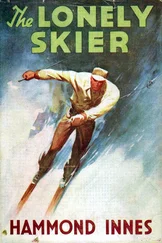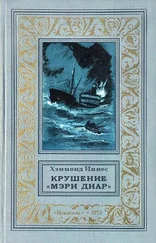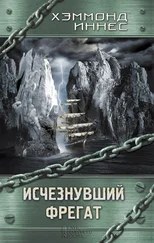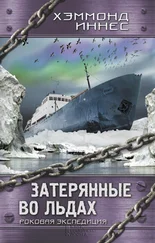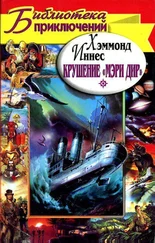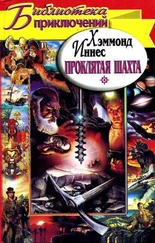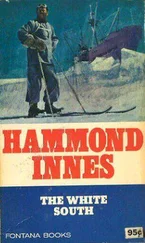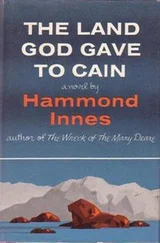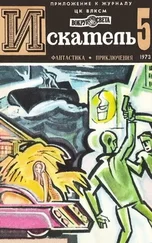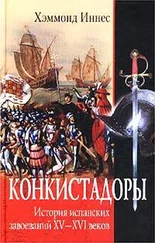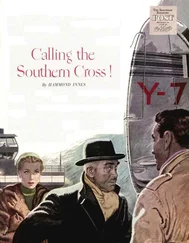“She ran away,” she sobbed. “She was afraid of life-like Ruth and me. She didn’t want to be hurt any more.”
“Do you know anything about her before she came to Come Lucky?”
“A little — not much. She was in France, a British agent working with the resistance. She operated a radio for them. She was with her father, and then, when he was killed, she worked with another man and—” She hesitated and then said, “I think she fell in love—” Her voice trailed off on a note of sadness.
“Was he killed — this fellow she was in love with?”
She nodded. “Yes, I think so. But she wouldn’t talk about it. I think she used up a whole lifetime in those few years. She is a little afraid of life now.”
“I see.” Footsteps sounded on the stairs and I let go of her shoulders.
“Here you are.” Ruth Garret held out a small mahogany box to me. “I almost forgot about it. She gave it to me Inst night.”
“Did she say anything when she handed it to you?”
“No. Only that it was for you. The key is in the lock.” I looked at her and knew by the way her eyes avoided mine that she had opened it and knew what was inside. She hadn’t intended to give it to me.
“Is there any message inside?” I asked.
She stiffened angrily. “No.” She turned away and walked out of the room, holding herself very erect.
Her sister suddenly giggled. “Ruth doesn’t like to be found out. I shall have to be very deaf for at least a week now.” Her eyes twinkled at me through her tears. And then, with a sudden disconcerting change of mood, “Please go to Vancouver and bring her back. I shall miss her terribly.”
“I’m sorry,” I said. “I shan’t be going to Vancouver.”
“Will you let pride—”
“It isn’t pride,” I said. “It’s common sense.” On a sudden impulse, I bent down and kissed her forehead. “Thank you for telling me a little about her. And if she does come back, tell her to stayaway from the Kingdom. Tell her to go back to Vancouver till it’s all over.”
“Till — it’s all over?”
“Yes. Till it’s all over.” I went out onto the boarded sidewalk then and walked slowly back to the hotel, the little mahogany box clutched under my arm. Johnny Curs fairs and Jeff were just leaving, I left the box in my room and walked with them down to their car. I hadn’t seen Boy that morning and I asked about him.
“He’s gone off into the mountains,” Johnny answered. “He’s like that. As long as Keogh was here he was full of optimism. But now he’s like a broody hen.” His fingers dug into my flesh as he held my arm. “Bruce, you know what you’re doing, do you?”
“I think so,” I said.
He nodded slowly, looking me straight in the eyes. “Yes, I guess you do. You don’t care, do you?”
“How do you mean?”
“About life — and death. It doesn’t scare you the way it does most people.” He bit on the end of the matchstick clamped between his teeth and spat the chewed end of it out. “If you want me, phone Jeff. If I’m in Jasper, I’ll come. Understand?” His hand gripped mine.
“That’s good of you, Johnny,” I said.
He climbed into the station wagon and a moment later they were slithering down through the mud to the lakeside.
I walked slowly back to the hotel. The big barroom was empty, the whole place strangely silent and deserted. My friends had gone. I had nothing to do now but wait for the arrival of Acheson. I climbed wearily up to my room. The mahogany box lay on the bed where I had tossed it. I picked it up and went over to the window, weighing it in my hands, speculating about its contents and oddly reluctant to open it.
With a quick movement of my fingers I turned the key in the lock and opened the lid. Inside the box there was something wrapped up in a silk scarf. I took it out, still wrapped, and held it in my hand, feeling the hardness of the metal, the old, familiar shape of it, I had stripped one of these from the dead body of an officer of the 21st Panzer Division and I’d carried it in my holster over two thousand miles of desert warfare.
I unwound the silk scarf, and the Luger fell into the palm of my hand as naturally as that other had done all those years back. My finger curled automatically to the trigger. The black butt of it was notched as mine had been. I counted seven notches. And above the notches was scratched a name — Paul Morton.
I sat down on the bed, staring at the thing. Paul Morton! Paul Morton was the name of the man who had been my grandfather’s partner in the flotation of the Rocky Mountain Oil Exploration Company, the man who had run out on him with all the capital of the company. Could it be the same Morton? I searched quickly in the box, but there was no message, nothing but four spare magazines, all loaded. I wondered how Morton had come to possess a Luger. And I wondered also how Jean Lucas had become the owner of Morton’s gun.
There was a knock on the door. I slipped the ugly-looking weapon under my pillow. “Come in.”
It was Pauline. “There are two men here asking for you, Bruce.”
Acheson! “Tell them I’m coming down right away.” I slipped the Luger into my hip pocket. The action was quite automatic and I found myself smiling at it as I went downstairs. Jean was being a little overmelodramatic. They might play it rough, but not that rough. And yet the odd thing is that I’m certain the presence of that gun in my pocket gave me confidence. It was as though the years between the end of the war and that moment were wiped away and I was back in command, with men under me and a life to be lived for the day only. It was a good feeling. I liked it. It seemed to give me buoyancy and energy. And when I found myself face to face with Acheson and Henry Fergus, I almost laughed, thinking of how they’d have made out at Knightsbridge in the African desert with only a couple of tanks left and the whole ring of dunes spitting flame.
“Let’s go into the bar,” I said. “We can talk there.”
Henry Fergus was a tall, spare man with a slight stoop to his shoulders. He came straight to the point. “How much do you want, Wetheral?”
“I’m not selling,” I said.
“What was this drilling contractor doing out here?” Acheson asked.
“Is that any business of yours?” I demanded. “I suppose you’ve been talking to Trevedian?”
Acheson nodded. “If you’re thinking of drilling up in the Kingdom, I have to remind you that you don’t own the mineral rights. They were mortgaged to Mr. Fergus’ father. Now that he is dead—”
“Just who are you acting for, Acheson?” I said, “Me or Fergus?”
His eyes widened slightly at my tone, and the florid coloring of his smoothly polished cheeks deepened. “For both of you,” he said sharply. “And it’s lucky for you that I am, otherwise Mr. Fergus here would never have considered the idea—”
“That’s a lie,” I said. “Fergus was considering completing the dam over a year ago. It was only because his father insisted on a survey first that construction was postponed until the year.” He stared at me, his mouth slightly open. “You’re not acting for me, Acheson,” I said. “You never have been. You’re acting for Fergus here. As for the mineral rights, I suppose you didn’t bother to check with the Bank of Canada about who has them now?”
“What are you getting at?” Fergus demanded.
For answer I pulled out my wallet and handed him the covering letter I had received with the documents. He read it through slowly. Not a muscle of his face moved. Then he passed it across to Acheson. I watched the solicitor’s face. He wasn’t a poker player like Fergus.
“How did you get these?” he demanded angrily. “What yarn did you spin the old man?” He turned to Fergus. “I think we could challenge this.”
Читать дальше

